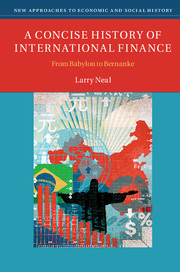Book contents
- Frontmatter
- Contents
- List of figures
- List of boxes
- List of tables
- Preface
- 1 Introduction
- 2 Distant beginnings: the first 3,000 years
- 3 The Italians invent modern finance
- 4 The rise of international financial capitalism: the seventeenth century
- 5 The “Big Bang” of financial capitalism: financing and re-financing the Mississippi and South Sea Companies, 1688–1720
- 6 The rise and spread of financial capitalism, 1720–1789
- 7 Financial innovations during the “birth of the modern,” 1789–1830: a tale of three revolutions
- 8 British recovery and attempts to imitate in the US, France, and Germany, 1825–1850
- 9 Financial globalization takes off: the spread of sterling and the rise of the gold standard, 1848–1879
- 10 The first global financial market and the classical gold standard, 1880–1914
- 11 The Thirty Years War and the disruption of international finance, 1914–1944
- 12 The Bretton Woods era and the re-emergence of global finance, 1945–1973
- 13 From turmoil to the “Great Moderation,” 1973–2007
- 14 The sub-prime crisis and the aftermath, 2007–2014
- References
- Index
13 - From turmoil to the “Great Moderation,” 1973–2007
Published online by Cambridge University Press: 05 October 2015
- Frontmatter
- Contents
- List of figures
- List of boxes
- List of tables
- Preface
- 1 Introduction
- 2 Distant beginnings: the first 3,000 years
- 3 The Italians invent modern finance
- 4 The rise of international financial capitalism: the seventeenth century
- 5 The “Big Bang” of financial capitalism: financing and re-financing the Mississippi and South Sea Companies, 1688–1720
- 6 The rise and spread of financial capitalism, 1720–1789
- 7 Financial innovations during the “birth of the modern,” 1789–1830: a tale of three revolutions
- 8 British recovery and attempts to imitate in the US, France, and Germany, 1825–1850
- 9 Financial globalization takes off: the spread of sterling and the rise of the gold standard, 1848–1879
- 10 The first global financial market and the classical gold standard, 1880–1914
- 11 The Thirty Years War and the disruption of international finance, 1914–1944
- 12 The Bretton Woods era and the re-emergence of global finance, 1945–1973
- 13 From turmoil to the “Great Moderation,” 1973–2007
- 14 The sub-prime crisis and the aftermath, 2007–2014
- References
- Index
Summary
The end of the Bretton Woods era had long been predicted. In 1958, the Belgian–American economist, Robert Triffin, had spelled out what became known as the “Triffin dilemma.” The dilemma was that as international demand for a reserve currency rose with the expansion of world trade, the nation supplying the reserve currency would have to keep running balance of payments deficits on current account, which would make its currency worth less (Triffin 1958). The death throes of the Bretton Woods System over the period from August 15, 1971 to February 12, 1973 foreshadowed two monetary phenomena that became permanent parts of the international financial system thereafter:
flexible exchange rates, with the US dollar sometimes falling and occasionally rising against all other currencies, and
rising prices of gold internationally, accompanied by rising rates of inflation for most countries.
Both phenomena were natural outcomes of the Triffin dilemma, and various economists had predicted that the dilemma would eventually be resolved either by flexible exchange rates or by international agreement to raise the price of gold. What was not analyzed and could not have been foreseen were the effects of the successive oil shocks in 1973 and 1979. Especially remarkable was the resurgence of financial globalization that mimicked in many ways the earlier period of globalization during the classical gold standard of the late nineteenth century. How did the three phenomena – floating exchange rates, rising price of gold, and sudden increases in oil prices – interact to create financial globalization again, but under quite different background conditions than under the classical gold standard? The answer lies in the various ways that the trilemma of open macroeconomics can be resolved. One of the three desirable policies for a country open to foreign trade has to be given up, whether it is fixed exchange rates, monetary independence, or access to foreign capital. The classical gold standard resolved the trilemma by each participating country forfeiting monetary independence. The central banks were left to do whatever was needed to maintain fixed exchange rates with the other countries on the gold standard. This led to an unprecedented surge of international capital flows at the time (Obstfeld and Taylor 2004).
- Type
- Chapter
- Information
- A Concise History of International FinanceFrom Babylon to Bernanke, pp. 272 - 293Publisher: Cambridge University PressPrint publication year: 2015

